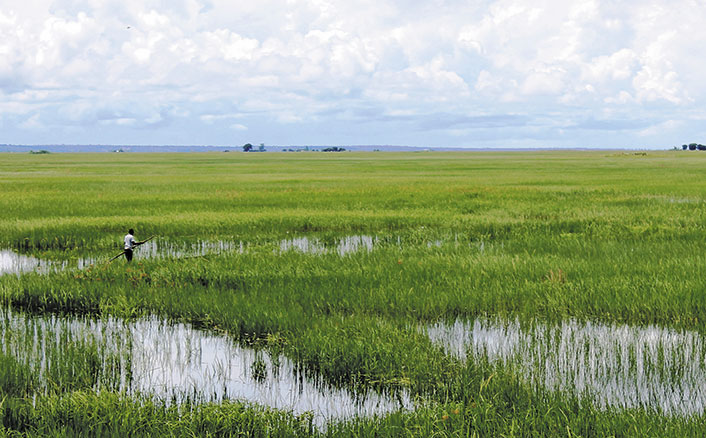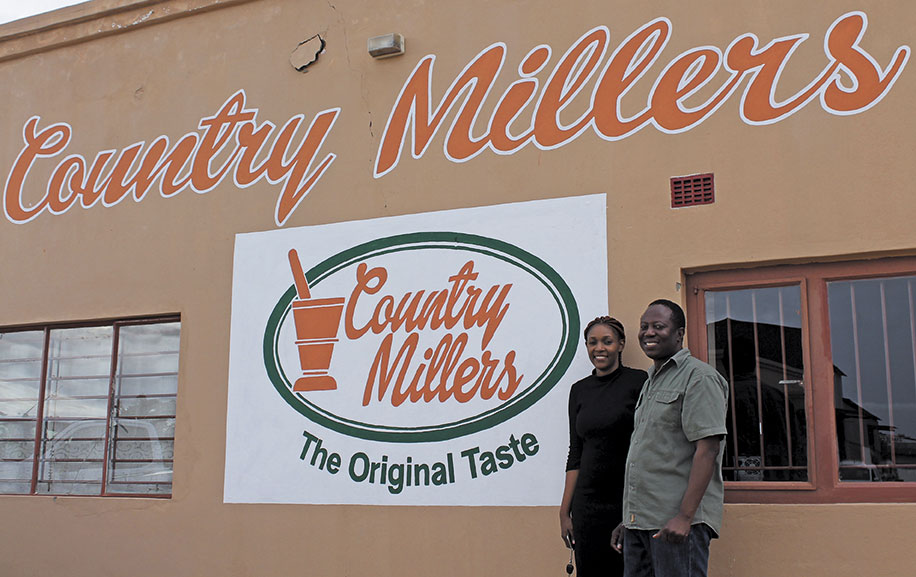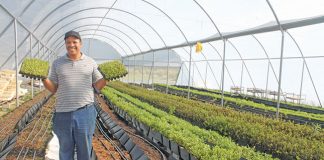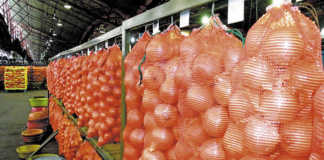
Photo: By Lloyd Phillips
First-time visitors to Zambia would probably find it difficult to believe that the M9 between the country’s capital, Lusaka, in Lusaka Province, and Mongu, the provincial capital of the Western Province, is an arterial route.
Driving this 600km stretch of road is arduous and often hellishly rough on vehicles, their human occupants and their cargo.
This may be the reason why Western Province’s one million residents often feel as if they live thousands of kilometres from civilisation and need to rely on themselves to survive.
READ How Africa can emulate India’s agricultural success
One person with exactly this approach is Mukumbuta Mukumbuta (47), a lifelong Mongu resident who has entrepreneurship and business acumen coursing through his veins.
Zambia’s Civil Society for Poverty Reduction (CSPR) ranks the 126 000km2 Western Province as the second-poorest in the country, although the widely held informal perception among its residents is that their province is, in reality, the poorest.

This is easy for an outsider to believe when the CSPR describes Western Province in the following words: “Characterised by difficult geographical and climatic conditions, it has limited arable land resources that can sustain crop production.
Since [Zambia achieved] independence [in October 1964], the province has experienced a period of economic relative isolation compared to other provinces.”
In light of the challenges that Western Province’s smallholder farmers face daily, and in a country that reportedly does not provide sufficient social grants to its citizens, these farmers’ only option is to continue doing their utmost to grow crops whose harvests are vital for feeding themselves and their families and generating income to pay for other living expenses.
Launching a legacy
Mukumbuta says that his late father, Induna Ikambwa Kalaluka Mukumbuta, who also came from a farming background, long ago saw the opportunity to provide Western Province’s smallholder farmers with much-needed maize milling services.
“At the time my father started his maize hammer milling business, in about 1985, most of Western Province’s smallholder farmers had their wives and daughters using musi and chika [traditional wooden pestles and mortars] to manually grind their maize grain into meal to be used for cooking into buhobe, a traditional maize porridge,” he says.
Most of these farmers wanted their maize milled for their own consumption, and they paid Ikambwa either in cash or with a portion of their maize harvest.
He would mill any maize grain that he received as payment and sell the meal in and around Mongu for cash.
Despite owning six hammer mills operating in Mongu and two nearby villages, Ikambwa’s dream was to own a large maize-milling plant in Mongu.
Sadly, he died before being able to achieve this goal.
Running with the dream
Having assisted his father with running his businesses since leaving school in 1987, Mukumbuta absorbed Ikambwa’s business skills and used these to his own advantage.
In 1993,he left his father’s business legacy in the capable hands of his siblings, and independently started his own enterprise, Mongu Hardware.
The company did so well so quickly that since 1995, Mukumbuta has expanded into off-road transport, his Country Lodge chain, a commercial fuel station, and a mineral water bottling and distribution business.
READ The basics of maize production
He adds, however, that while all this was happening, he never forgot his father’s longing to own a mill, especially as demand for maize meal in Mongu had shot up over the years with population growth.
“I wanted to fulfil this dream, and conditions in 2016 were ripe for this investment.”
Thanks to the success of his businesses and support from Indo Zambia Bank, he had the cash flow to establish a large-scale maize milling plant in Mongu, which he called Country Millers.
Research and planning
“My team and I had to make sure that we would consistently produce and sell only the best-quality maize meal, so that it would appeal to our consumers more than that of our competitors.
It would need to be as white as possible, not off-white or yellow, and have an absolute minimum of foreign particles, such as remnants of maize cobs or leaves.”
His mill also had to avoid producing maize meal that was too fine, as Western Province’s consumers would complain that they needed to use more to produce a serving of buhobe.
But it could not be too coarse either, as this would make it difficult to cook through and leave an unpleasant texture in the mouth.
READ Agricultural development’s education gap
As part of his extensive research, Mukumbuta consulted with experienced millers in Zambia to determine which milling equipment would be best suited to his requirements.
“I looked at the quality of the maize meal that each mill produced, compared purchase, installation and running costs, and evaluated both the ease of maintenance and actual operation of the mill,” he recalls.
“After seeing a Roff Industries maize mill in Lusaka, I visited Roff’s headquarters in South Africa in September 2016 to consult the company and negotiate directly with them.”
Wanting his maize mill erected in Mongu, Mukumbuta also had to factor in the logistical challenges of getting all the necessary equipment and parts to this relatively isolated town.
Start of a journey
“I settled on buying the Roff R70 mill, which can mill 4t of maize grain per hour, or about 100t over 24 hours, into both Super Breakfast Meal and Super Roller Meal.
It required six super-link trucks travelling seven days from South Africa to Mongu, via Namibia, to get the entire mill to my premises,” he says.
In early 2017 it cost Mukumbuta approximately US$1,5 million (R18 million) to establish his complete maize milling enterprise, including vehicles to fetch maize grain and deliver maize meal.
Country Millers’ maize milling business sources as much of its white maize grain as possible from smallholder farmers within a 45km radius of Mongu.
However, with stiff competition for this scarce local resource, Mukumbuta is able to gather only about 1 000t of white maize grain from local smallholder farmers annually.
This is just a fraction of his total requirement, which amounts to between 14 000t and 19 000t, so he buys the balance from the government’s Food Reserve Agency and grain marketing companies.
Mukumbuta says that since 2017, the Zambian government has elected to allow market forces to determine maize grain and maize meal prices.
This has put pressure on new and smaller millers, including Country Millers, who are still cementing their brands among Zambian consumers.
Quality worth paying for
“There are far larger millers who’ve been operating for many years already and that benefit from economies of scale,” Mukumbuta says.
“The only way I can outcompete them is to produce top-quality, but still value-for-money, mealie meal.
At the moment I sell a 25kg bag of Roller Meal for 65 kwacha [R80] while my cheapest competitor sells the same-sized bag for K53 [R66].”
He adds that his company’s sales figures confirm that Western Province’s consumers are prepared to pay more for Country Millers’ maize meal as they believe they are getting top-quality, value-for-money products.
“All of the maize meal that we produce is sold.
We’re actually unable to meet the full demand for our products at the moment,” says Mukumbuta.
Country Millers produces 10kg and 25kg bags of both Super Breakfast Meal and Super Roller Meal.
Its breakfast meal is slightly more refined than its roller meal.
While these two products are Country Millers’ primary income generators, the business also sells maize bran and coarse No.3 maize meal, which are residues of the milling process.
A fleet of 10 trucks and vans distributes the company’s products to retailers within a 200km radius of the mill.
Meeting demand
On his future plans for Country Millers, Mukumbuta says he wants to expand production capacity so that he can come closer to meeting the ever-growing demand for the enterprise’s products across Western Province.
Plans to start supplying maize meal to Shoprite retail chain stores across Zambia are also in the pipeline.
“This will require a bigger mill. It will most definitely be a Roff mill because I’m very satisfied with the one we’ve been using.”
Mukumbuta wants to double milling capacity to 200t of maize grain a day.
“It means that I’ll have to expand my infrastructure to house the larger mill, but I have the space to do this,” he says.
Phone Country Millers on +260 969 555 500, or email [email protected].
Lloyd Phillips visited Country Millers as a sponsored guest of Roff Industries and Mukumbuta Mukumbuta.












